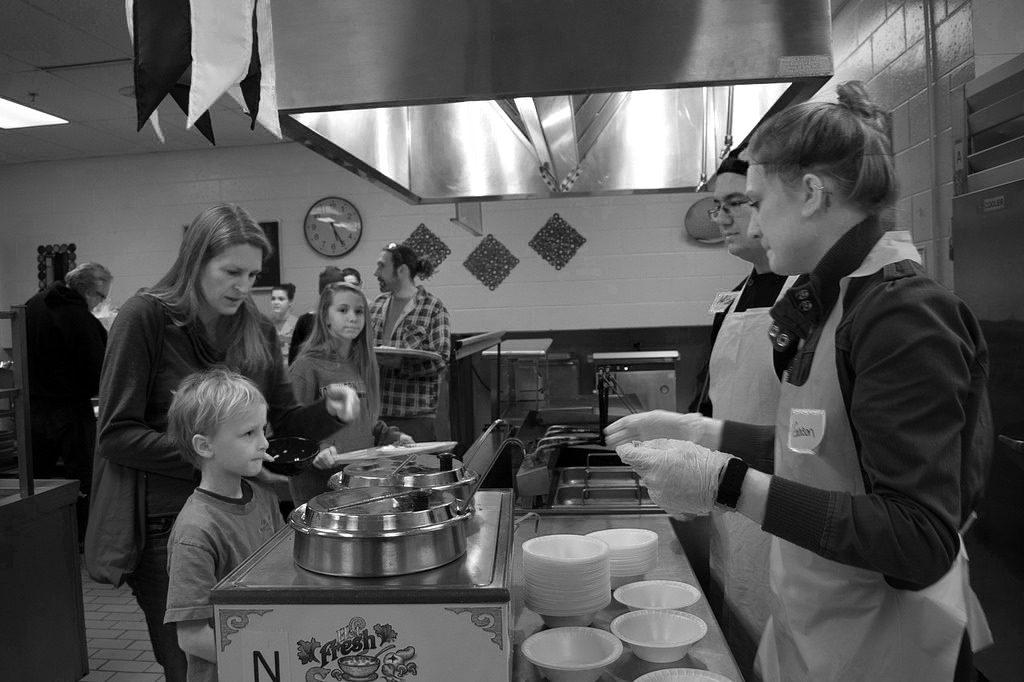Skinning squash and prepping bison with cranberries
for stew, NAS 207: Seasonal Exploration Anishinaabe Language class members and 160 volunteers spent time in the Jacobetti
culinary kitchen, collectively cooking and preparing
traditional meals for The First Nations Food Taster (FNFT).
The FNFT provides an array of foods from traditional and contemporary Native American recipes–food that most people generally do not have available anymore. These recipes may change from year to year depending on what is available through donation, Native American Student Association (NASA) President Kristina Misegan said.
“The First Nations Food Taster is an opportunity to provide guests with an array of specialty foods that could have been eaten by our Native American
ancestors,” Misegan said. “Through the Decolonizing Diet Project (DDP) Cookbook, participants created these recipes with ingredients listed in the DDP master list.”
Martin Reinhardt, Ph.D., who co-authored the DDP Cookbook with fellow researchers, Leora Lancaster and April Lindala, features indigenous food recipes from the Great Lakes Region
and the outcomes of eating a decolonized food diet–food that was locally available before
Columbus’ colonization.
“The Decolonizing Diet Project is an exploratory study of the relationship between people and indigenous foods of the Great Lakes Region,” NASA Vice President Grey Shea said. “When the study was being conducted, a group committed on eating certain amounts of indigenous foods for a period of time to see how this change affected them, and to create recipes. Not all of the recipes for the FNFT are
directly from the DDP, but most are inspired by it.”
Shea said there is a DDP
cookbook available at the
NMU Bookstore.
Fry bread will not be served
at the FNFT, as it is a cultural but not a traditional food, Shea said. Over 80 percent of American Indian and Alaska Native
adults from ages 20 to 74 are overweight or obese, according to the U.S. Department of Health
& Human Services.
“We [Native Americans] did not traditionally have the
ingredients. It [fry bread] is a direct response to colonialism as those ingredients were distributed
to us through commodities and we made what we could to
survive. Fry bread continues to
affect people of Indian Country by causing health issues
like diabetes and heart disease,”
Shea said.
The FNFT is a dish-bag event. Event organizers urge participants to help the environment by bringing their unbreakable and reusable dishware needed for
a meal, including a plate, bowl,
silverware, drinking container and napkin to be entered into
a raffle to win prizes.
The FNFT is a fundraiser for the annual “Learning to Walk Together,” a traditional
Powwow, which is held in
the winter semester hosted by
NASA.
Without the consistent help
of volunteers, NASA could not provide this array of foods,
Misegan said. NASA is still looking for volunteers, each volunteer
who completes a full shift
assisting in the kitchen, prepping, cooking, cleaning or helping
in the dining area, serving,
refilling items, set-up, clean-up or collecting tickets at the door will receive one free meal voucher to eat at the FNFT. Visit www.nmu.edu/nativeamericanstudies/first-nations-food-taster to sign up.
Donation items still needed for the FNFT include farm fresh eggs, sunbutter, raffle prizes and silent auction items.
Purchase tickets for the
FNFT at the door or in advance at
the Center for Native American
Studies in room 112,
Whitman Hall. NMU
students with an ID, elders,
veteran or children ages 5-10:
$5 in advance, $7 at the
door. General admission: $10
in advance, $12 at the door.
























